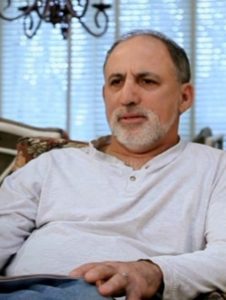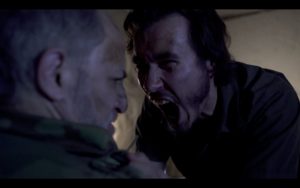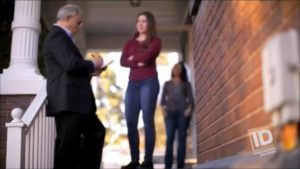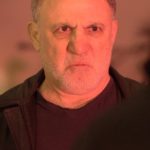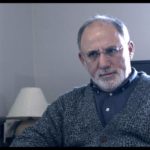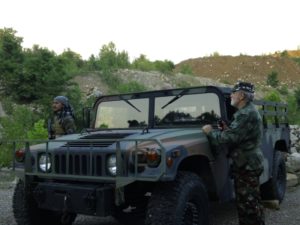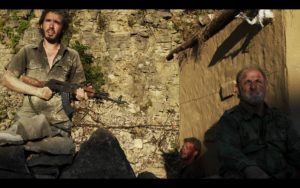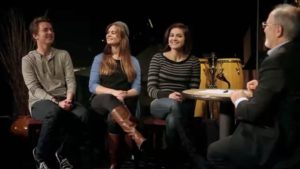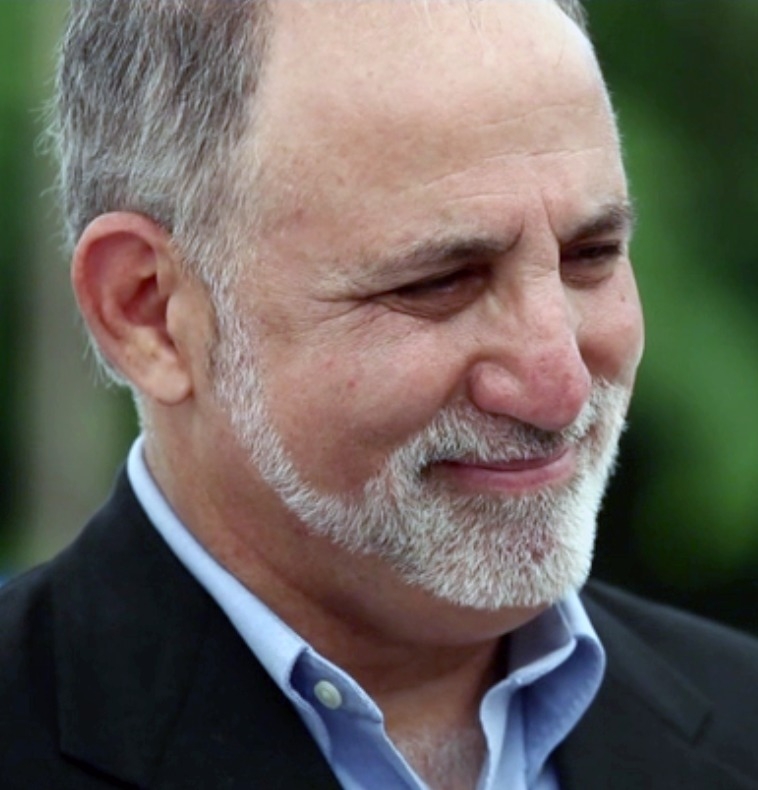Because of my interactions the past two years with some incredible independent film champions and filmmakers, I have become a massive proponent of independent films and those involved with these projects. Once in a while, I come across such a treasured person that I am stunned that it took me so long to “discover” this industry professional. Wayne E. Brown is one such spectacular person and actor, and recently, I had the honor of chatting with him about some notable moments in his career as well as a couple of landmark occasions in his life as a whole.
RH: So glad it worked out to chat with you today, Wayne.
WB: My pleasure, Ruth.
So how did you get started in acting?
I have been acting since I was about six or seven. All I can recall is that I was in a summer camp production of The Sound of Music, and my big role was a dog. If you fast-forward several years, my first speaking role was when I was about thirteen, and it was in a school production. Then I didn’t do any acting for another ten years or so. I started doing church plays and dinner theater. I was involved with stage from the early ’80’s to 2012.
My understanding is that most actors do start out on the stage. Was acting something you considered for a career or were you looking at doing something else?
I wasn’t looking to do it for a career up until almost ten years ago.
What was your career up until that point?
I was in the automotive industry from 1978 till around 2008. I was full-time in that industry in a variety of positions: service training instructor, technical writer, mechanic, service engineer, and a whole bunch more different types of work over that thirty-year span. My last full-time automotive job was with Audi, and my position along with others was moved to Virginia. We decided to stay here, though they did offer to move us there. It was right about this time that I started doing film acting almost regularly. But that doesn’t mean every month. It was around two to five times a year.
How did you get started with the film and TV industry?
I wasn’t doing my first movie when I decided to make this a career. And I have to admit I still look for other day jobs and full-time positions in the event that I feel it’s worth making that transition. I haven’t so far. My acting career has kind of amped up in the last few years. What got me going semi-full-time was after the Audi thing, I looked for full-time employment and just nothing. And I’m talking for two or three years. During that time, I registered with a couple of talent agencies, and I did get some calls. While I got lots of calls, only a few of the stuff turned out to be paid roles. I decided to just wait and see and to do more if I could. While I’ve been an extra in about one-third of the productions I’ve been in, I try to shy away from them now. In the industry, “uncredited” doesn’t look as good on your resume unless extra and background work is your focus. With the time involved in doing extra work, I could be in a feature with a fairly decent part.
I notice several of your credits appear to be Christian or faith-based films.
Well, I’ve done a few. Of course, I much prefer being in faith-based films and working with the people involved in these projects.
What movie or show do you consider your first lead role or significant role?
While it’s not a lead role, but kinda significant, I would say it was the first film I was in. I don’t even think it’s on IMDB. It’s called Rage of Justice. I remember our middle son telling me about this independent film that was going to be shot in our area. He knew somebody and to make a long story short, I auditioned and got the role. It was a minor supporting role, but that was my first real taste of film acting, I suppose.
Why is that role so memorable for you?
Well, because it was my first film and I actually had a speaking role. The character was a little different, but not too terribly so. I played a physical therapist, and just the experience of it was pretty significant for me. Now, that may not have been my first movie–I’m not one hundred percent sure. But I think the next film I was in was Richard Heat, and again, just the experience of it. I had two lines, I think. And another memorable part of that one was I got to be in a scene with my wife. Either she volunteered or I volunteered her; she’s a trooper. We were in a diner scene and someone is running away from the law and they’re asking if we had seen this guy.
Do you happen to know what film was your first lead role?
Unexpected Places was my first lead role. That one was fun. It turns out that one reason that I got the role was…it was based on a true story and I kind of look like the husband of the wife that story is mainly about. But fortunately, that wasn’t the only reason I got cast for it. I tell you, going from stage acting and getting your lines down for that compared to screen acting…I find myself using almost the same routine, but not as intense. But that was a big role I had, and I don’t know how many days we shot. I’m very grateful, not only because it was a lead role, but the story was good and working with the people I got to work with was a real blessing. I met other people who did other Christian films, and from a networking standpoint, that was great.
I know you had all this theater experience, but did you actually take any formal training for acting?
Not for stage. I took a workshop called “Acting and Camera Techniques,” and the John Powers Talent Agency Management company used to hold acting classes for TV acting. While not necessarily for acting, but it kind of blends in, I took an executive presentation skills class. My boss at the time said, “You’re gonna be the one who’s gonna do our safety training.” And I was like, “Okay.” So after the first one, he said, “You know, there’s this three-day workshop by this professional company and I’m gonna have you go through that.”
I can see how any kind of public speaking or presentation training could help in acting. I can see how those skills would cross over.
One thing that I vividly recall that was pointed out to me in those three days was that they would give us one technique. We would practice it, and then we would perform a monologue. Then we would repeat it with a different technique. Same monologue and four or five different techniques over the course of the three days. And then at the very end, they would show us the first video that was done of us doing the monologue before any training and the very last. What I remember vividly is he said to watch what I was doing with my hand. I looked, and I had no clue that with my thumb I was fidgeting with my ring finger. Unfortunately, and I guess this is true with a lot of people, the more acting you do, the more you start to notice stuff on other films. “Oh, he’s shaking his hand, and he doesn’t even know it!”
I understand completely. Being a singer, I can be very critical of all these singing shows that are popular now. Often I’ll notice how many singers direct themselves when they’re singing. I used to do it myself.
Definitely the same idea.
A lot of your work has been with independent films. What do you see as the benefits and challenges of doing independent films?
Well, let’s deal with the challenges first. One of those challenges is experience. I’ve worked with student filmmakers from universities. I’ve worked with people who have just recently started their own film companies and they are not students. And I tell you unless they’re really gifted, that’s a big challenge. If they don’t have experience and equipment…because even lighting can make or break a scene. In my experience, I think the biggest challenge is working with people who are just starting out or don’t have much experience. But that’s certainly not to say all of them.
One of my most recent films I did a couple months back, and the production company is relatively new. It might be their fourth feature if I remember right. To me, they were one of the best as far as working with them. Like I told the producer and a couple of the others, “I read this script twice before starting–not just my lines, but the whole thing. If the quality of your camera work and the quality of your acting matches the quality of the story, this is really gonna be a good film.” I have seen some of their previous work. In fact, we talked about those works. One of them chuckled and said, “Yeah, I remember our first one.” But that happens with anyone.
Another challenge is that at least half of independent works don’t pay. And that is a challenge if you want to make a living. I totally understand because these are very low-budget productions. Some of the ones that do pay don’t pay very much. But really, I don’t mind that.
As far as the benefits go, indie films seem to be more flexible with input, with schedule, and just the intimacy part. You have less people involved in the production, so there is the chance to really get to know each other over the course of working on the project.
I fully agree about the lack of experience as I have seen some independent works where you can tell they need more experience and it’s not on the same level as what you might see on mainstream TV or film. But what I appreciate about indie films is that it becomes focused on the story. It’s not about the special effects, the star names, or anything like that. The story becomes the most important part of the project.
I fully agree with you on that point.
Do you have any other recent or upcoming works that you can mention?
Let’s start with recent. Since last November, I think the first thing I was in was a cable TV series called Disappeared. It’s a crime reenactment show that airs on Investigation Discovery. I played a detective in that, and technically that was all featured extra work in the sense that I had a lot of face time, but no lines. It was mainly a documentary that was narrated. But it was so fun. My character got to interview someone at their front door, and when they called “action,” I’ve got my notebook out, and I was able to say stuff like, “So how long have you been on this diet?” You see, nobody knew what we were saying.
After that, there’s a feature called Methodical, and while I didn’t play the lead, I played the lead’s conscience. Right now, work on this one is paused.
There is a feature that is not on IMDB yet even though I keep bugging the director and telling him I’ll help him get it on IMDB. It’s called CatMan. It’s about a wannabe superhero. I don’t think I had ever been a fight scene till this movie came along. I played an old, rowdy, biker-type.
I played a psychiatrist in the feature called Wronged. The story is about a guy who came back from the war with PTSD.
There is a short still in production called Inside the Facetook Murders. Instead of Facebook. If you take the title literally, that’s what it is. It’s about a serial killer. I played a detective in that one.
The one I mentioned earlier that I only recently finished shooting is called Sinjar: Valley of the Shadow. I can’t wait till this company does their next movie because I sure hope I get to work with them again. Great people–they were such a blessing.
Their hope for this film is to wrap up post-production by the end of the year. Then they want to do a local premiere and then while things may change, they plan for it to go to DVD.
As far as any other upcoming works, I have signed with a couple others. One is Harvest Moon. Another is Way to Abbottabad. Those are the firm ones, but of course, I have a lot of auditions.
Now, outside of film, I have done two film interviews with folks I from previous films I had worked on. One was with A Horse Called Bear and the other is Lifestone Velocity. We’ll see. I might be able to do some more interviews with other folks from other productions.
Recently, I almost did an acting workshop at a film festival. All of my negotiations with those in charge were going well, but for some reason, the contract never arrived. We’ve kept on good terms, but as it turned out, I couldn’t have done it anyway, since their festival happened the same month I did Sinjar. I also found out later that they had to delay their film festival until at least October. And if I had signed a contract with them, I probably wouldn’t have even auditioned for Sinjar. And that would have been such a setback.
I know you mentioned something about 1974 being a significant year for you. That was actually the year I was born.
Oh, that was the year I was born again.
While you don’t have to give me your whole testimony, could you share a bit about your faith journey?
Well, as I look back, I can some situations throughout my life where the Lord was dealing with me through other people about becoming a Christian, and up until that last time, I wasn’t really open to the Lord. I was pretty lost.
I reconnected with a friend from high school who had not been a Christian, but he evidently had become a Christian at some point. He started witnessing to me and sharing things out of the Word of God with me. He kept encouraging me to read the New Testament, and I finally started to. I was reading Matthew, Mark, then halfway through Luke, my eyes were getting more open, and I was in awe of who Jesus was, what He said, and what He did.
Before this time, I think I had only gone to church twice in my lifetime, and it wasn’t because of my family. But in January of ’74, I became a Christian, and God has shown His faithfulness ever since. My wife and I actually met at the church where I became a Christian, and she had become a Christian the year before.
So do you have any memorable moments from your film career that you’d like to share with us?
Yes, if you are familiar with the film Reel Steel, the last ten minutes of that movie was shot in downtown Detroit for eleven days. It’s this big robot fight scene. I was a featured extra in that film. During one scene, some assistant director pulled about twelve or fifteen of us aside, and she said, “In this scene when the announcer announces the end of the fight, you guys run into that ring. Storm the ring and go crazy. On a scale of one to ten, do a twelve!” In my mind, I was going, “Whoah! Okay!” So it came time for that scene, and I ran in there and was jumping up and down, screaming. The ring was pretty packed. I heard “cut!” And we went back to our positions for another take. She came up to me and said, “Was that you yelling and jumping up and down?” I said, “Yeah, I was doing that.” She said, “Tone it down!” I was tempted to say, “Well, what did you mean by a ‘twelve’ on a scale of one to ten?” But that’s something I have learned. You get tempted to justify what you did, I mean, even in life. But I didn’t. {laughs}
Do you think that had something to do with your theater training?
I don’t know about that. I think if someone tells you to do a twelve on a scale of one to ten and it’s a fight scene, I think you do just that. But speaking of theater versus film, overacting can be an issue. One of the times this happened to me was during Sinjar. In the story, I’m a prisoner. A grenade gets thrown into the prison, and we see it. Well, in the reaction shot, at first, my eyes bulged, so we stopped filming. They told me to tone the eyes down a little because they were doing an extreme close-up of me. But that’s a never-ending lesson.
But let me share one last story with you. There’s a movie I was in called Demoted. There was an old TV show called Alias with Jennifer Garner. Michael Vartan was her co-star. He was in this movie, and during this particular scene, it’s at a wedding reception. I was positioned in this particular scene, and right before the take, various people in the scene were told what to do, but the director looked at me and said, “All I want you to do is watch Vartan as he walks across.” Well, sure! I wasn’t wearing my glasses, and I have double vision, but I could see two of Vartan. He’s walking, and I’m looking and all of a sudden, I hear, “Cut!” It didn’t sound pleasant, and the director came up to me and said, “Sir, don’t look in the camera!” Because I couldn’t see, I didn’t realize that between Vartan and the crowd was the cameraman shooting almost an up-shot. I was supposed to watch Vartan, but instead, my eyes went right to the camera. That was another time I was so tempted to explain and justify and tell why I wasn’t going to do it again, but I didn’t. They are busy; they have tight schedules. You just take the direction and you incorporate it for the next shot.
Wayne, I cannot tell you how much I have enjoyed our conversation today. Thank you for sharing so much of yourself.
My pleasure, Ruth. Thank you for taking the time and being willing to feature me.
When it comes to independent films, I don’t think I have ever met anyone quite like Wayne, and I mean that in the most sincere way possible. All too often, actors are rather egocentric when it comes to their career, which is, of course, the nature of the business. Additionally, actors don’t typically relate stories where they are willing to take direction without an argument as they may worry it will paint them in a negative light. In most circumstances, actors and other industry professionals prefer to justify their actions rather than defer to authority. What I see in Wayne is the desire and drive to work together for the common good regardless of who is right or wrong, and even if he would prefer asserting himself, he has that God-given meekness which causes him to react in the way God would have him respond to those in authority over him. And as far as I’m concerned, on a set, the director is in charge and should always be met with respect no matter what your personal opinion may be. Perhaps that is not the popular opinion in the world today, but it is what I believe, and I recognize that same humble, teachable spirit within Wayne. And because of his commitment to follow the example of Christ, I have no doubt that God will continue to bless him personally and professionally.
While I have not actually seen any of these projects in which Wayne has been featured, I cannot tell you how enthusiastic I am to check out as many of his works as possible. In fact, the one of which he spoke so highly, Sinjar: Valley of the Shadow, is definitely on my watch list, and the moment I discover it is coming to DVD, I plan on ordering it. I would invite my readers to look up Wayne’s work on IMDB (link listed below), and even though he is not really on social media at present, I believe that supporting his work is still rather rewarding. I am grateful to actors like him who are not afraid to share their faith with others, and I am certain that as his life and career continue, not only will he be blessed, but those of us who support him and benefit from his works will be equally as blessed!
FOLLOW WAYNE
10 Comments
-
Hi Adam! Appreciate your kind comments. What a blessing meeting you and your family and working with you this year:-)
-
Thanks Brian! Long time, eh? Hope all is well.
-
-
Great interview with a great guy! Wayne is a gem and pleasure to work with. Thank you also for your interest in our movie Sinjar: Valley of the Shadow. God bless!
-
Author
Adam, my pleasure! I look forward to seeing Sinjar when it is released. And I’m grateful to have interviewed Wayne!
-
-
-
Congrats to you Wayne, great interview. Keep up the good work.
-
Author
Thanks for stopping by Brian! Wayne is awesome!
-
-
-
I’m a little in awe of how kind you are with the contents of this interview:-)
Thanks so much Ruth!
-
Author
Wayne, it is my pleasure. I enjoy using the gifts God has given me for His glory. Just like you do. Blessings!
-
-
What an interesting life to lead and blessed to live his dream. Thank you for this.
-
Author
Wow Trisha you are on the ball! I just posted this. Thank you for reading!
-


